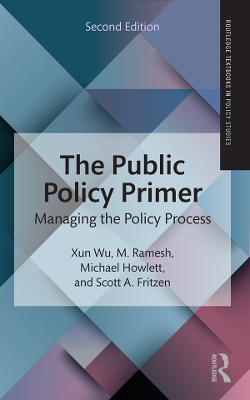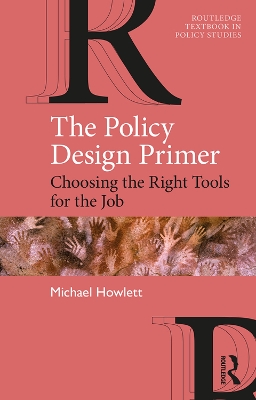Routledge Textbooks in Policy Studies
3 total works
The Public Policy Primer
by Xun Wu, M. Ramesh, Michael Howlett, and Scott A. Fritzen
Fully revised for a second edition, this essential guide provides a concise and accessible overview of the public policy process: agenda-setting, policy formulation, decision-making, implementation, and evaluation.
The book provides an introduction to the key policy functions, the challenges they entail, and how the challenges may be addressed by policy actors. Written from a comparative perspective, the authors include examples from a diverse range of countries at different stages of development, highlighting key principles and practices through which policy actors can effectively manage their policy processes and outcomes.
Key features of the second edition:
- fully updated and revised content throughout;
- expanded references and further reading;
- more guidance towards understanding the key concepts in public policy.
This important tool offers students of public policy and policy practitioners guidance on how to make, implement, and evaluate public policies in ways that improve citizens' lives.
The second edition of this highly regarded book provides a concise and accessible introduction to the principles and elements of policy design in contemporary governance. It examines in detail the range of substantive and procedural policy instruments that together comprise the toolbox from which governments choose tools to resolve policy problems and the principles and practices that lead to their use.
Guiding readers through the study of the many different kinds of instruments used by governments in carrying out their tasks, adapting to, and altering, their environments, this book:
- Discusses current trends in instrument use linked to factors such as globalization and the increasingly networked, digital and collaborative nature of modern society;
- Considers the principles and practices behind the selection and use of specific types of instruments in contemporary government and the future research agenda of policy design studies and practices;
- Evaluates in detail the merits, demerits and rationales for the use of specific organization, regulatory, financial and information-based tools and the trends visible in their use including recent efforts to develop and deploy new tools such as nudges and choice architectures, co-production and crowd-sourcing;
- Addresses the issues surrounding not only individual tools but also concerning the evolution and development of instrument mixes, their relationship to policy styles and the challenges involved in their (re)design.
Providing a comprehensive overview of this essential component of modern governance and featuring helpful definitions of key concepts and further reading, this book is essential reading for all students of public policy, administration and management.
The Policy Design Primer is a concise and practical introduction to the principles and elements of policy design in contemporary governance. Guiding students through the study of the instruments used by governments in carrying out their tasks, adapting to, and altering their environments, this book:
- Examines the range of substantive and procedural policy instruments that together comprise the toolbox from which governments select specific tools expected to resolve policy problems,
- Considers the principles behind the selection and use of specific types of instruments in contemporary government,
- Addresses the issues of instrument mixes and their (re)design in a discussion of the future research agenda of policy design and
- Discusses several current trends in instrument use often linked to factors such as globalization and the increasingly networked nature of modern society.
This readily digestible and informative book provides a comprehensive overview of this essential component of modern governance, featuring helpful definitions of key concepts and further reading.
This book is essential reading for all students of public policy, administration and management as well as more broadly for relevant courses in health, social welfare, environment, development and local government, in addition to those managers and practitioners involved in Executive Education and policy design work on the ground.


